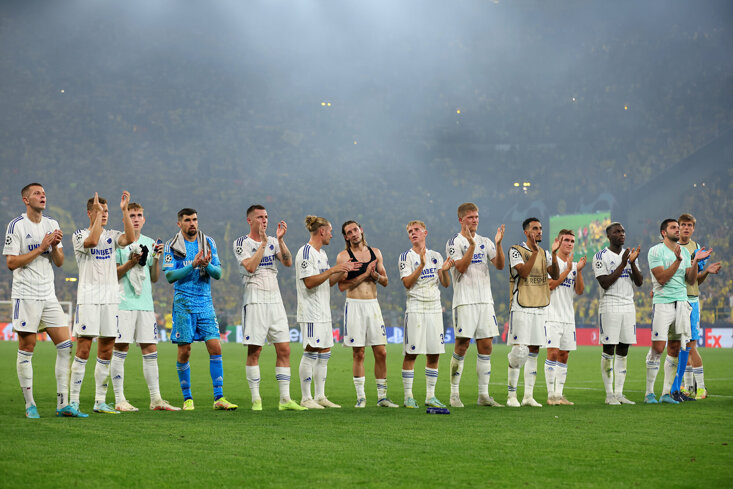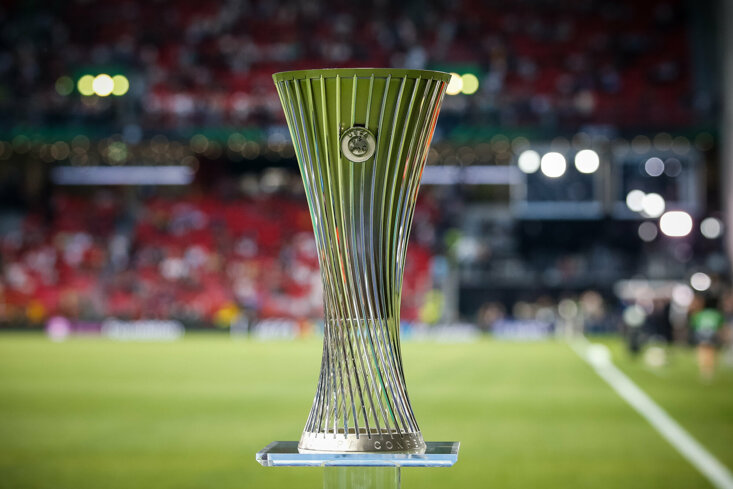After battling through qualifying, F.C. Copenhagen returned to the Champions League group stages this season after a six-year absence.
A daunting double-header with Manchester City looms over the next few weeks, but competing against Europe’s elite is what the Scandinavian club aspires to do every season - especially considering the financial rewards on offer.
A tentative start to the campaign has left Copenhagen trailing early pacesetters Randers by 10 points. There have been three winners of the Superliga in the last three years - Midtjylland, Brøndby IF and Copenhagen - and an unexpected tussle for supremacy is developing again with some of the bigger names in the country struggling to keep pace.
READ MORE:
- Why we love our football club: The kit, the colours, the crest
- Why we love our football club: The stadium
- Champions League 2022-23 outrights - Betfred*
The unpredictability of the Superliga contrasts with the monotonous scene across many domestic competitions around Europe. The Champions League has become equally as dreary until the latter stages, with clubs from wealthy markets exerting their financial dominance to monopolise the most cherished trophy in the club game.
It has been 18 years since Jose Mourinho danced down the Old Trafford touchline and Porto prised the European Cup from the vice-like grip of the big nations. “In the football ecosystem, the gap is getting wider and wider, especially with the big leagues and big clubs pulling away,” Daniel Rommedahl, Director of Football Operations at Copenhagen, tells The Sportsman in a conversation regarding the dwindling aspirations of big clubs from smaller nations.
“It is not ideal as clubs want to keep the dream alive. Every club wants to feel like they have a chance, but in the long run, if this continues, the narrative that everyone can win against everyone will diminish and be gone. Clubs need to be rewarded for doing well, but a general issue in football is that everyone is more or less limited to their own country.”
Rommedahl is a board member at the influential European Club Association (ECA) - and he uses his position to highlight the worth and value of clubs outside the established order. He believes the creation of the Conference League is an acknowledgement from Uefa that clubs outside the big leagues require more opportunities to reap the considerable benefits of extended European involvement.
“We played quite an active part in the creation of the new system through the ECA, and we tried to work on getting our voices heard, especially with our counterparts that are in a similar position to what we are,” explains Rommedahl.
“Clubs of our size, from smaller or medium-sized countries, have a lot in common as we search for balance. Borders limit our way of working, but the new system, from my perspective, benefits everybody. The introduction of the Conference League into European football is a good example of creating something that is not simply for bigger countries, but also for smaller ones or medium-sized ones.”

The Conference League has been a welcome addition; it has freshened up a tired landscape. Changes anticipated from 2024-25 onwards, including the Champions League being upped from 32 to 36 clubs appear, though, to be another move towards appeasing the desires of the wealthiest.
The financial details behind the 2024-27 cycle have yet to be determined, but it is plausible that England or Spain could have upwards of five teams competing in the revamped Champions League. Europe’s elite competition could have sought to be more inclusive, but instead they have opted to funnel further finance into the coffers of clubs from the big leagues.
“Overall, I’m quite positive with the new model, not just the formula of the system, with more matches and more teams, but the access to the three competitions, which I think is fair,” argues Rommedahl. “One could have said that the bigger clubs could have taken even more, but I think that of the four additional Champions League spots, at least two of them will go to the big five, but the rest will go to other clubs. You always wish to ask for more, but you have to find a compromise for everybody.
“There is always a discussion about whether the Champions League receives too much compared to the Europa League or Conference League, but what is the fair share of every competition? The fair share is not what you see today. The Champions League gets about 75% of the distribution model from Uefa, but it would be 92% based on how the rights are sold. There is much more solidarity in Europe. Conference League prize money is not even close to what the rights have been sold for, but solidarity has ensured everybody gets something despite the actual value maybe not being there.
“My concern is more on the general financial side of football and where it is heading. 95% of all the money coming in from the Champions League, Europa League or Conference League goes back to all clubs. In England, all the money the Danish television broadcaster pays for the Premier League is distributed within the English football model. If Denmark pays €100 million for Premier League rights, why does some of that money not go back into the entire football ecosystem? Not just the English, because it’s not only English players playing in the Premier League.
“Following the Uefa competitions model could be one way to even the gap or give something back to the whole of European football – and that should apply to every league. If the Italians get television rights from Belgium, then some of those monies should go to Belgium, but that is something for the leagues to argue about.”

The football landscape is changing, but Rommedahl is not anticipating further drama surrounding the merits of the much-maligned European Super League anytime soon. “I would never say never say never in this world, but I would hate to see a president or CEO from one of those clubs come back and try it again in the next couple of years,” he adds.
“It was the strangest process I have been involved in. I was sitting on a board with colleagues I trusted and had good relationships with. We have a Whatsapp group, and when it all happened, you could see ‘this person has left the group, this person has left the group’ and so on. They left without warning. I’d never experienced such a way of working before, and hopefully, I never will again.
“It creates trust issues, especially on a personal level with these people because you can never trust them in terms of doing business with them.”
*18+ | BeGambleAware | Odds Subject to Change